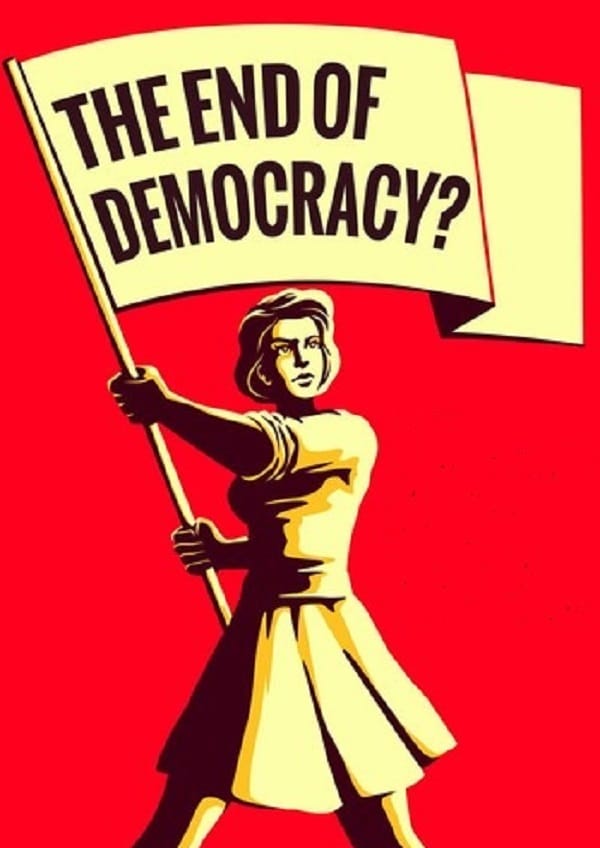Table of Contents
Dr Muriel Newman
nzcpr.com
Dr Muriel Newman established the New Zealand Centre for Political Research as a public policy think tank in 2005 after nine years as a Member of Parliament. A former Chamber of Commerce President, her background is in business and education.
Warning
Long read: 2092 words

The liberty of a democracy is not safe if private power becomes stronger than the democratic state itself. That in its essence is fascism: ownership of government by an individual, by a group, or any controlling private power.
President Franklin D Roosevelt
In April last year, Local Government Minister Nanaia Mahuta announced a review of local government: “They are now facing a wave of reforms that will significantly affect their traditional roles and functions… This offers an important opportunity to embody the Treaty partnership through the role and representation of iwi/Maori in local government.”
She was referring to Labour’s planned removal of two core roles and sources of funding from councils, namely the provision of water services and Resource Management Act consenting.
A five-member review panel was appointed and the terms of reference included, “how our system of local democracy needs to evolve over the next 30 years, to improve the wellbeing of New Zealand communities and the environment, and actively embody the Treaty partnership.”
An emerging theme of the reforms is for local government to become agents for central government including helping to deliver health goals and climate change objectives.
A submission produced by Local Government New Zealand’s (LGNZ) Community Boards Executive Committee (CBEC) is indicative of the radical ideas being considered. They are calling for empowered “Community Councils” to not only take over many of the traditional roles of local government, but to also be co-governed: “The default membership should be such that 50 per cent are elected by residents on the Maori roll and 50 per cent by residents on the general role.”
Whether CBEC was advised by the LGNZ’s Maori Committee – which includes the minister’s sister Tipa Mahuta – is not known, but what is known is that the Attorney General’s advice to the Rotorua Council that co-governance discriminates against non-Maori has been disregarded!
It is not an overstatement to say the changes being proposed are radical. Yet again, we are seeing the revolutionary He Puapua agenda being put into effect. Not content with passing control of water to Maori interests, Nanaia Mahuta and her family connections are going to dismember local government and reconstruct it with Maori in the driving seat.
We would urge anyone concerned about such developments to read the discussion document HERE and put in a submission by June 30 – full details can be found HERE.
As the government doubles down on their He Puapua objectives, it’s time to question the fundamental legitimacy of their actions.
But first a reminder of how we got to this point.
When she was first elected prime minister, Jacinda Ardern promised her government would be “transformational”. With communist roots that enabled her to remain the president of the International Union of Socialist Youth – even after being elected to our parliament – she is now using her majority power to introduce a socialist agenda more radical than anything ever seen in this country before. Embracing identity politics and racial division, the target for her revolutionary transformation is democracy itself.
As unbelievable as it sounds, our democratically elected New Zealand prime minister is attempting to replace one of the world’s longest-standing and most successful democracies with tribal rule – one ‘co-governance’ deal at a time.
These co-governance deals are designed to empower the iwi elite – a privileged tribal aristocracy that runs vast multi-million-dollar private business development corporations that pay no tax.
This subversive strategy began in earnest in 2019, when the PM authorised the creation of a plan to enact the United Nations Declaration of the Rights of indigenous Peoples, which had been signed by the National government in 2010 at the behest of their Maori Party coalition partner.
Nanaia Mahuta, then the Minister of Maori Development, appointed a nine-member technical working group (which included a close family member with a second close family member seconded to help) to produce a declaration implementation plan. Their He Puapua report, with its goal of tribal rule by 2040 – the 200th anniversary of the Treaty of Waitangi – was delivered to the government in November 2019.
We now know that a number of He Puapua objectives were rolled out during 2020 – under cover of the Covid pandemic – including the use of Aotearoa as the name of our country and the imposition of Maori language and culture at every opportunity.
We also now know that not only was Labour’s coalition partner New Zealand First and Deputy Prime Minister Winston Peters kept in the dark about the PM’s plan to replace democracy with tribal rule, so too were voters during the 2020 election.
That means Prime Minister Ardern is undermining our democracy without any mandate from New Zealand voters.
The impact of her radical agenda on New Zealand is far reaching.
Already the local government electoral system has been changed to give iwi greater influence, a separate Maori Health Authority has been introduced to prioritise race over clinical need in healthcare and iwi are now being given control of Three Waters infrastructure and services.
Nor does it stop there. Already signalled is greater iwi control of the conservation estate, stronger iwi involvement in the resource consenting process and a dominant iwi influence in plant and animal research and commercial development through the Wai 262 claim.
But if Jacinda Ardern has no mandate from voters for the radical transformations that are already underway, under what authority is she undertaking such extremism?
The first justification being advanced, is that a Treaty partnership exists that requires 50 per cent of the power of government to be transferred to the tribal aristocracy.
Their story goes that when the Treaty of Waitangi was signed on behalf of Queen Victoria, she entered into a 50:50 partnership with Maori tribes, who at the time were engaged in intertribal warfare, slavery and cannibalism.
Even former Prime Minister David Lange is described as ridiculing the notion: “He really didn’t believe that Queen Victoria had signed a treaty of equality and partnership with ‘500 thumbprints’.”
This week’s guest commentator, former judge and law lecturer Anthony Willy, has exposed the Treaty partnership concept as a deliberate fabrication, pointing out in previous commentaries that not only is it a constitutional impossibility, but claims that it arose from the Court of Appeal Lands Case are without foundation.
In this latest analysis he goes further, explaining that contrary to what the activists claim, not only has the Treaty never been recognised at international law, but it has now ‘expired’:
There are indications that the academics advising the Maori radicals have woken up to the fact that calling the compact entered into in 1840 a ‘Treaty’ is a courtesy title only and not something recognised at international law. This for the simple reason that to qualify as a ‘Treaty’ it must arise from agreements made between sovereign states. In 1840 there was in fact no sovereign ruler in New Zealand but merely a collection of tribal families. The resulting document was therefore in the nature of a contract between the Crown and those tribal chiefs who agreed to sign…
Like all such documents it has a natural life span which expires when the circumstances become so changed by the passage of time and events make it irrelevant. It would have been no different if the document were a legally recognised treaty. History is littered with examples of expired treaties as a result of changed circumstances. For example, nobody in their right mind would, think that the promises made in the Treaty of Versailles following the defeat of Germany in the first world war any longer governs the European territorial claims of the French, the Germans and the British. So it is with the ‘Treaty of Waitangi’.
In light of such matters, the primary goal of the iwi elite pushing for Maori supremacy is to replace New Zealand’s highly effective unwritten constitution, with a written one based on the Treaty.
If that were ever to occur, the result would be disastrous for this country.
Unelected judges with the power to overrule our democratically elected parliament would take control of law making in New Zealand. And with the Treaty at the heart of a new constitution, every law would prioritise the Treaty ‘partners’ over everyone else.
This is what Labour’s powerful Maori Caucus and iwi leaders are planning right now.
Their last attempt to introduce a Treaty-based constitution was led by the Maori Party in 2011 – unbelievably, with the blessing of National.
It was resoundingly defeated – thanks largely to NZCPR supporters, who got behind our nation-wide campaign to oppose a Treaty-based constitution (you can read our report HERE).
But that was not the end of the matter, as here it is once again being progressed, but this time under the cloak of the UN Indigenous Rights Declaration.
The problem the separatists face, however, is that declarations are only symbolic. Like treaties, they need to be enacted as statutes to give them legal authority.
The UN Declaration was invoked using the Westminster tradition of prerogative power. This enables governments to sign up to international agreements without the approval of parliament.
That’s why, at the time, former Prime Minister John Key said the declaration was largely symbolic.
Since it has not been ratified by parliament, it has no legal force and cannot be used by Prime Minister Ardern to justify her attempt to replace our democracy with tribal rule. She is doing that under her own volition.
In fact, the UN Indigenous Rights Declaration even stipulates that sovereign states are under no obligation to adopt provisions if doing so would impinge on political unity or over-ride the rights and freedoms of others in a democratic society.
In his commentary, Anthony Willy is unequivocal about this:
Rest in peace the aspirations of co-governance and co-government of New Zealand sought by the activists and their fellow travellers relying on the Declaration. It is of overriding importance and clear beyond doubt that in terms of the declaration no indigenous person can enjoy a right which damages the existence of a democratically elected government. That immediately rules out any notion of the governance of the state or territorial local authorities being shared between indigenous peoples and those who came after. Inherent in this is the recognition that in a democratic state (which the United Nations clearly regards as the gold standard) votes, local and national, are allocated per head of the voting population regardless of race, colour or creed.
So, as a country, where do we stand.
Firstly, there is no legal justification for “co-governance”. The now-expired Treaty of Waitangi did not introduce co-governance – that right has been invented by tribal activists seeking Maori supremacy, and is being advanced by radicals within the Labour Government.
And secondly, the UN Indigenous Rights Declaration, is being manipulated and used as a smokescreen to legitimise Jacinda Ardern’s revolutionary attempt to ‘transform’ our democracy by giving a ruling tribal aristocracy power over the lives of other New Zealanders.
Anthony Willy sums up our situation:
There can be no question of any sharing of government, local or national, relying on the Declaration, neither can reliance on the Treaty support such a claim given that on any view of the document it vests sovereignty in the Crown in Parliament. To have any purpose there must be another agenda in play and it has become clear what that is. What we used to call the Labour Party, and which enjoys an absolute majority which the advocates for MMP said could not happen, is now in the grip of a group of Maori activists who will stop at nothing to undermine the sovereignty of our Parliament, our democracy and the Rule of Law.
New Zealand democracy is under attack. But the threat does not come from other nations – the threat comes from within. It’s time for Kiwis to wake up to the civil revolution that is occurring within our society. The agenda of the iwi elite to restore pre-1840 Maori governance to New Zealand is well advanced and progressing rapidly under Jacinda Ardern’s guidance.








